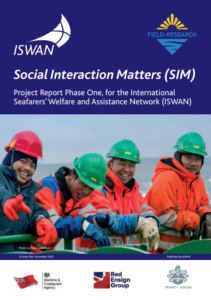ISWAN conducted a research concerning the wellbeing for crew onboard and the challenges arising from isolation, highlighting the importance of social interaction and the key role it plays in seafarer’s life.
Accordingly, the research called “Phase One of the Social Interaction Matters (SIM) Project identified or confirmed that social interaction can improve the mental and physical health and well-being of seafarers and demonstrated clear benefits for:
- developing trust and better working relations with other crew members (family away from home).
- developing team cohesion and improved resilience that can increase motivation and productivity at sea.
- improved safety practice.
- combatting isolation and providing a release from the daily work environment.
The research also identified areas that can negatively impact opportunities for bringing people together socially on board, including:
- fatigue, lack of time and increased workloads.
- shorter port calls and less shore leave.
- the effectiveness of the leadership and management skills on board and ashore.
The need for this project was recognized long before the widespread impact of the COVID-19 pandemic, but the consequential crew change crisis has placed even more importance on the need for strong crew cohesion.
ISWAN reported that the project consists of three parts; For Phase One, the research consisted of a large survey of seafarers and other maritime stakeholders as well as 10 in-depth telephone interviews.
- Regular social interaction on board benefits physical and mental health, happiness and motivation, helps build relationships, teams and trust, improves work safety, and reduces isolation and stress;
- Good leadership, supporting an inclusive and unifying on board culture, is necessary to encourage crew to interact comfortably together;
- Increasingly heavy workloads and fatigue were the biggest barriers to social interaction on board;
- Physical activities were more engaged with on board than online activities. The opposite is true with activities undertaken in port;
- Respondents between 29 – 40 years old were most likely to think that social interaction had increased greatly on board over the span of their careers. Figures for this decline considerably for
people 41 years old and above; - Wi-Fi was viewed as both a driver and barrier of social interaction. It was more likely to be considered a barrier by nonseafarers and those with over 20 years+ experience within the
industry. - The top activities for generating social interaction were barbeques(Food) (p.31), table tennis (Sports), quizzes, games and cards (Entertainment) and using WhatsApp groups (Social media).
- A balance needs to be struck between achieving efficient shipping operations and the social needs of the crew that facilitate this. Many industry stakeholders are collectively responsible and must work together to ensure the best crew welfare.
- Further research is recommended into the impact of gender and diversity on social interaction on board. Focused investigation is also suggested into the specific role leadership can play in
maintaining a healthy work and life balance for all crew on board.
The research confirms that social life onboard matters and is of high importance.
Although the project continues, the report details many important takeaways for shipping companies and ship operators.
For example, the research shows that crew differences including nationality, gender and age should be considered in the planning of social activities as these factors can influence recreational preferences. It is therefore important for ship management to consider what engages and brings people together and adapt suitable activities to their own company requirements. The research provides numerous examples of such activities and these can be adapted to accommodate most vessel types, voyage patterns, nationalities, and time constraints. Ensuring that crew engage socially, even for small amounts of time every day, is vital and should be a priority on every voyage, however long.
Dr Kate Pike, research lead and author of the report stated that
Although measures can be put in place to facilitate recreational gatherings on board, it is these fundamental issues that need to be addressed for a long-term impact to take effect. Social interaction on board has a unifying impact that promotes a happier, more motivated crew that can work more effectively and safely together.
Concluding, ISWAN published the project with the support of the Maritime and Coastguard Agency (MCA) and Red Ensign Group who sponsor the project. The SIM Project was initiated with the primary objective of encouraging social interaction on board.
Concluding, to learn more about Phase One Project, click herebelow































































